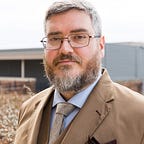Politics and Trump
Trump’s VP versus the Academy
How disconnected academics elevate poverty porn, why, and what it means
Today, Republican presidential candidate Donald Trump broke the news that JD Vance, Senator from Ohio, will be his running mate and presumptive vice president. Social media has erupted with the usual backlash from the left at anything and everything Trump does (or does not do). The tip of the spear for this particular backlash is the academy, bemoaning Vance’s understanding of government, public service, and his use of the vulnerable populations in Hillbilly Elegy. But, this opposition obscures something fundamental in the academy, a crippling addiction that afflicts large swathes of professors everywhere.
You might imagine that I am going to throttle former President Trump’s choice of VP. I’m not. Frankly, it is a strategic and sound choice given his aims and imperatives. This post will be less comfortable for folks I admire and a guild to which I owe a tremendous amount of my happiness and success. This is not our usual piece in 3Streams, this is necessarily an opinionated take on what Vance has meant to the academy and its lesson for broader concerns about the modern role of higher education in society.
The addiction? Poverty porn. Despite the social media outcry, it was, in fact, academics who did more to publicize and elevate Vance’s work on Appalachia than any like-minded cadre of partisans. I have written in this publication about Vance’s use of Appalachia as a lever for a bourgeoning political career. His skill at crafting narratives that weave social ills in Appalachia with rote conservative worldviews and social prescriptions is undeniable. Less obvious is why academics, time and again, fiend over this content. This addiction has tremendous consequences for the communities academics serve and the future of higher education.
Academics on the whole have a deep desire to foster social good and uplift with the power of science, be that social, physical, biological, or even humanities that remind us of our shared experiences, hopes, and fears. This aim is laudable. The problem is that most academics are from a class disconnected from these vulnerable communities. Academics have an appetite like no one else for thick descriptions of social ills to which their expertise might be put to use. And so, works like Hillbilly Elegy lead to a spate of what are usually narcissistic discussions of how these populations can be “saved” or improved in terms of academic metrics, approaches, or worldviews.
This general reaction to poverty porn ranges from ridiculous to dangerous. For instance, I am an Appalachian with generations-deep roots in the region, who moved back to work on our many, real problems. Yet, I have often been advised to read Vance’s work so that I understand Appalachia better — not by conservatives, but by liberal colleagues on campus. On the dangerous end, this addiction fuels stereotypes and perceptions of regions that gain life not only in narratives about place and people but in resulting science. That the academy elevated this depiction of a place is undeniable when considering Vance’s (and others in the same mold) speaking engagements.
While much of the debate about free speech on campus is disingenuous, at issue here is not the liberal or conservative nature of speech, but the content in either case. Vance’s narrative technique is skillful, but it is not the sole purview of the political right. Countless left-leaning takes on Appalachia and places like it, abound. Poverty porn has a staying power that is universal and knows no ideological boundary. It appears as often in public policy as in public debate.
Most outside the academy are not aware of academic views of keeping people in places where they have life experience. Put simply, the academy is firmly against it. Old notions of mitigating intellectual “incest” pervade the academy, and serve some useful purposes. Namely, they ensure diversity of thought and approaches to understanding the world that redound immensely to the students we teach in our classrooms. In my long career in academics, however, I find too often that professors themselves are not doing much to learn from or understand, the communities they serve. Most professors travel from their college towns to tourist destinations and, of course, the nearest international airport.
If we combine the notion that professors are more comfortable reading about these places than experiencing them with the fact that most professors are not from the areas and regions they serve, it is easy to see how institutions of higher education become disconnected from the public they serve. It also means they tend to substitute others’ narratives for those of the place and pontificate about those narratives from a sanitary, safe place.
It is quite easy to see how this matters for vulnerable populations — they become the fodder of politically charged ideological discourse from both sides of the aisle. However, these dynamics cripple the academy itself. If the academy is disconnected from these communities, it certainly makes sense that these communities no longer see fit to fund or otherwise support institutions of higher education. Communities need a lot more from the academy than helping their children achieve better careers. They have problems that range from infrastructure to a need for better decision and collective action systems.
Places like Appalachia have myriad problems that might be solved by public policy. The problems are diverse in requiring both conservative and liberal solutions and perspectives. There is no greater economic and social force for good in a rural state than its major universities. As a group, Universities have to be better at talking about these things for the sake of themselves and the communities they serve. To do so, it is high time we took a critical look at our behaviors and how they mitigate our ability, to be honest brokers in these conversations and repair those bridges with our communities. Our (their) collective future depends on it. Vance is good, but he didn’t get there alone.
